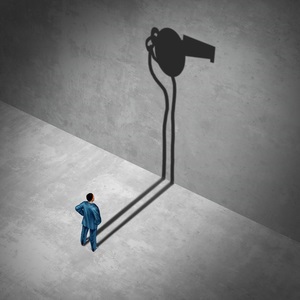Partner Mary Inman and Theranos whistleblower, Erika Cheung, speak on the Forbes' stage about whistleblowers & corporate accountability

On October 30, 2019, Constantine Cannon partner Mary Inman and Erika Cheung, founder of Ethics in Entrepreneurship and a former whistleblower who reported Theranos to health regulators, shared the stage in Detroit at the Forbes 30 under 30 conference to discuss the importance of whistleblowers and corporate accountability, as captured in the video below.
The discussions kicked off with Erika’s experience blowing the whistle on Theranos, a blood-testing start-up, where she discovered the company was using faulty technology to run its blood tests and communicated test results to patients that were fundamentally incorrect. Alarmed by the practices, Erika explained how she tried reporting her concerns internally but was repeatedly dismissed by her supervisors and board members. After many failed attempts to sound the alarm about the malpractice within the organisation, Erika decided to leave the company and find alternative ways to reveal the truth. As acknowledged by Erika, she never considered herself a whistleblower as she thought she was simply doing her job and seeking to protect patients. She was not aware of the existence of regulatory agencies to whom she could anonymously report her concerns and who had the power to hold her former employer accountable for the wrongdoing.
As an experienced international whistleblower lawyer, Mary observed that, prior to contacting legal counsel, whistleblowers usually try to report their concerns internally, giving their company a chance to remedy the issue. She further explained the rationale of the various American whistleblower programs (CFTC, SEC, IRS, and the False Claims Act), under which informants are paid a percentage of any fine imposed by the government, provided they bring information that government authorities are able to act upon. She stressed, however, that most individuals do not speak out purely for the financial benefit of doing so. Instead, whistleblowers who make the often lifechanging decision to speak out do so at great personal and professional risk to themselves, acknowledging they may be blacklisted and never be able to work in their chosen industry again. The financial rewards therefore serve as a safety net, something to encourage truth-tellers to undertake the risks of speaking out for the greater public good.
Discussing the personal toll of whistleblowing, Mary remarked that, although whistleblowing has a profound effect on people, recent whistleblower stories demonstrate that individuals can go on to have a productive life afterwards. For instance, whistleblowers are increasingly being hired as compliance officers at companies who want to show their employees that they value people who speak up. However, Mary cautioned, this is still more of an exception than the rule and varies depending on the industry. Some whistleblowers become prominent spokespeople for change, often having the effect of cleaning up an industry-wide problem. In Mary’s words “whistleblowing can be a monumental decision and it’s a decision that is taken in extremis – they are at the point of time in their jobs when they are trying to bring information about wrongdoing to light and have been silenced – one cannot think clearly at that point”. The role of whistleblower attorneys is therefore to understand their clients’ personal circumstances, guide and support them through the process, as well as explain and prepare them for the potential outcomes of coming forward, both good and bad.
Drawing the discussions to an end, Mary urged companies to put effective internal reporting mechanisms in place, so that employers can pay attention to their employees’ concerns. As the Theranos scandal made crystal clear, businesses need to hold a mirror up to themselves from their very inception, especially when fast-growing companies often become blinded by their own success and consider themselves too big to worry about trivial matters like ethics. After the Theranos revelations, Erika went on to co-found Ethics in Entrepreneurship, a non-profit focused on trying to teach companies from their inception to encourage and incorporate good corporate culture in technology development. It is vital that companies maintain good culture and create an environment to steer people into making good decisions as, in Mary’s words “it all starts at fundamental ethical questions”.
READ MORE:
- Mary Inman talks about whistleblowers as forward indicators of risk for their employers on “What Does It Profit?” podcast
- International Whistleblowers
- The Constantine Cannon Whistleblower Team
- I Think I Have a Whistleblower Case
- Whistleblower FAQs
- Watch Our Other Constantine Cannon Attorney Interviews
Tagged in: CC Lawyers, Importance of Whistleblowers, International Whistleblowers, Whistleblower Eligibility,